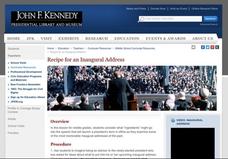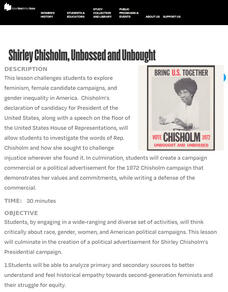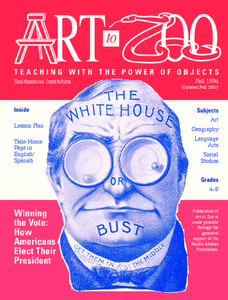Encyclopedia Britannica
Meta-Study: Political Brains
Are there differences in the brains of liberals and conservatives? That is the question young political scientists are challenged to answer. Class members examine studies, consider how the results are presented, and how the studies were...
Carolina K-12
The Electoral College
Put the Electoral College into perspective with a simulation of an election. Scholars experience an electoral vote, participate in an in-depth discussion on the topic, and engage in a congressional committee where they learn about the...
Encyclopedia Britannica
Candidate Book Report
After reading candidate biographies, class members select one candidate to research. They craft a report on the candidate's book, their position on issues, and the image the candidate wants to project.
Encyclopedia Britannica
Impeachment Explainer
Andrew Johnson (1868) Bill Clinton (1998) and Donald Trump (2019) were impeached by the House of Representatives. To demonstrate their understanding of the impeachment process, individual create their own "Impeachment Explainer." Writers...
Encyclopedia Britannica
Election Topic Deep Dive
Researchers go beyond the surface of an election issue to craft an objective report on the history of the issue, factors surrounding the issue, and factors in a candidate' biography that may influence a candidate's position on the issue....
PBS
What Are the Primaries and Caucuses?
What are the essential differences between primaries and caucuses? As part of a study of the process by which Americans select their candidates for US president, class members examine the nominating process, the changes that have...
John F. Kennedy Presidential Library & Museum
Recipe for an Inaugural Address
An inaugural address represents the first moments of a new beginning. Using John F. Kennedy's speech as a model for guided practice, groups examine the ingredients of an inaugural address. Individuals then repeat the analysis process...
Classroom Law Project
What are some of today’s voting issues? Voting in Oregon, youth vote, and technology
The youth vote. Rock the Vote. Vote-By-Mail. Electronic voting. Class members investigate issues facing today's voters, and the ways they have adapted over the years to optimize voter turnout.
C-SPAN
Polling and Public Opinion
Most people are eager to offer their opinions about topics of interest, but what's the most effective way to collect and assess these opinions as a matter of fact? High schoolers learn about the history of polling, as well as the...
Encyclopedia Britannica
Write an Election Day Letter
For some, getting to the polls to vote is no easy task. Voting may mean needing to choose between a job and civic duty. But what if Election Day was a national holiday? After reading an article about the pros and cons of designating...
National Woman's History Museum
Shirley Chisholm, Unbossed and Unbought
An engaging resource introduces young historians to Shirley Chisholm, the woman, the Black congresswoman, the activist, and the candidate for President in 1972. Class members study primary sources, watch a video of her announcing her run...
Curated OER
Cartoons for the Classroom: Charisma vs. Experience
In this current events worksheet, students analyze a political cartoon about the 2008 Presidential election and respond to 3 talking point questions.
Curated OER
Cartoons for the Classroom: Money and Politics, A History Lesson
In this current events worksheet, students analyze a political cartoon about campaign finance in America and respond to 3 talking point questions.
Curated OER
Electoral Politics
Students formulate their own opinions about the issues in an election campaign through a critical examination of political advertisements, candidate debates, and political cartoons.
Curated OER
Campaign 2004: Classroom Electorate
Young scholars role play as political analysts first forecasting the electoral college vote in a presidential election and then, following the results of the actual count. They study the role of swing states, and why political...
Curated OER
Results In On Mock Election
Students examine the two presidential candidates in 2000, and identify their own stance on campaign issues. They create fictional candidates that represent their beliefs, and write campaign speeches from their point of view.
Curated OER
Texas Kid Writes Book About Presidents
Arranged into small groups, learners read a paragraph of the news story "Texas Kid Writes Book About Presidents." As one reads, others mark the text (underlining important information and writing notes in the margin of the story). After...
Curated OER
1912: The Election that Changed the Century
The presidential election of 1912 was a turning point in American politics. Whoever won would reshape the political spectrum. Learn about the key issues, each party's politics, and the four men who wanted to become president: William...
Constitutional Rights Foundation
The Troubled Elections of 1796 and 1800
Congress does more than create new laws. Political scientists delve into the elections of 1796 and 1800 to understand how political parties, the Electoral College, and personal agendas affected the election process. The resource also...
National First Ladies' Library
Political Party History
Middle schoolers research and examine the role of political parties in the history of the twentieth century of the Unites States. They divide up into groups of four to analyze the twenty-six presidential campaigns and the candidates who...
Curated OER
Voter Behavior
Transform your government students into informed voters with this straightforward worksheet. Five matching questions and five multiple choice questions test students' knowledge on voter behavior and political parties, and the format...
Curated OER
Chisholm '72: Shirley Chisholm for President
Students view the film "Chisholm '72 - Unbought and Unbossed" about Shirley Chisholm's 1972 bid for the Presidency. They complete a writing assignment in response to the film and participate in class discussion.
Curated OER
US Presidents
Students work in small groups to analyze various presidential campaigns. In this presidential election lesson, students research election rules, candidates, and winners from 1900 to 2000. Students will create and present an oral report...
Curated OER
The White House or Bust: How Americans Elect Their President
Students explain the presidential duties and who is eligible to run for president. In this The White House or Bust article, students complete a map of the electoral college. In addition students analyze historical campaign posters....

























